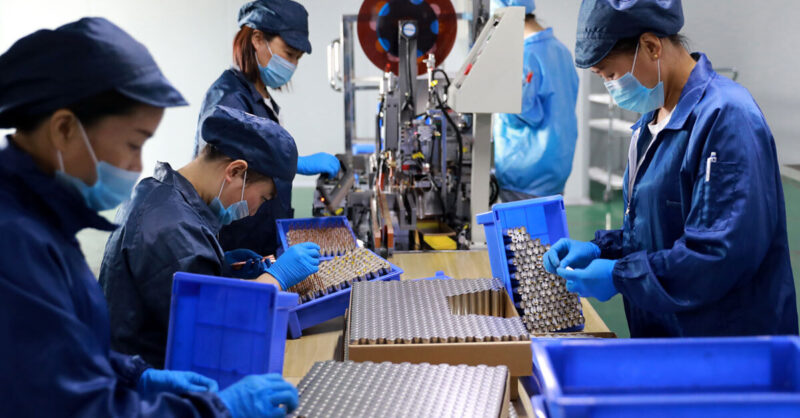Литий-ионный аккумулятор: революция в технологии хранения энергии
Введение
The demand for energy storage has been increasing rapidly in recent years due to the widespread adoption of renewable energy sources and the need for efficient electric vehicles. One technology that has been at the forefront of this revolution is the lithium-ion battery. This article will explore the significance of lithium-ion batteries in revolutionizing energy storage technology.
Background
Lithium-ion batteries were first introduced in the 1970s, but it was not until the 1990s that they gained commercial success. This breakthrough technology quickly became the preferred choice for portable electronic devices such as laptops and smartphones due to its high energy density and long cycle life.
Advantages of Lithium-ion Batteries
Lithium-ion batteries offer several advantages over other types of rechargeable batteries. Firstly, they have a higher energy density, meaning they can store more energy in a smaller size and weight. This makes them ideal for portable electronic devices and electric vehicles, where weight and space are critical factors.
Secondly, lithium-ion batteries have a low self-discharge rate compared to other battery chemistries. This means they can retain their charge for a longer time when not in use, making them more efficient and reliable.
Furthermore, lithium-ion batteries have a longer cycle life, meaning they can be charged and discharged many times before their performance significantly degrades. This makes them more cost-effective in the long run compared to other battery types.
Applications of Lithium-ion Batteries
The applications of lithium-ion batteries have expanded beyond portable electronic devices. Electric vehicles are one of the most significant areas where lithium-ion batteries have had a revolutionary impact. The ability of lithium-ion batteries to provide high energy density and fast charging capabilities has made electric vehicles more practical and appealing to consumers.
Another significant application is in renewable energy storage. Lithium-ion batteries can store excess energy generated from renewable sources like solar or wind power and release it when the demand is higher or when the renewable source is not available. This helps to stabilize the power grid and promotes the integration of renewable energy into the existing infrastructure.
Challenges and Future Developments
While lithium-ion batteries have revolutionized energy storage technology, there are still some challenges that need to be addressed. One of the main challenges is the limited availability of lithium resources. The demand for lithium-ion batteries has been growing rapidly, and finding sustainable sources of lithium is crucial for the industry’s future.

Another challenge is the safety concerns associated with lithium-ion batteries. Although rare, incidents of battery fires or explosions have been reported. Researchers and manufacturers are continuously working on improving the safety features of lithium-ion batteries to minimize these risks.
In terms of future developments, researchers are exploring new materials and technologies to improve the performance and energy density of lithium-ion batteries further. Graphene, for example, is being investigated as a potential replacement for traditional graphite anodes, which could lead to even higher energy densities.
Заключение
Lithium-ion batteries have revolutionized energy storage technology and have become an essential component in various applications. Their high energy density, long cycle life, and fast charging capabilities have made them the preferred choice for portable electronic devices and electric vehicles. Furthermore, the ability to store renewable energy has facilitated the integration of renewable sources into the existing power grid. While there are challenges to overcome, the future looks promising with ongoing research and developments in this field. Lithium-ion batteries will continue to play a crucial role in shaping the future of energy storage technology.
-
 В сегодняшней быстро развивающейся промышленной среде надежные и эффективные энергетические решения необходимы для поддержания бесперебойной работы. Компания Industrial Power Products Batteries (IPPB) находится на переднем крае предоставления высококачественных решений по накоплению энергии для широкого спектра промышленных применений. Благодаря своей приверженности инновациям, долговечности и устойчивости батареи IPPB стали предпочтительным выбором для предприятий по всему миру. ИППП...Читать далее
В сегодняшней быстро развивающейся промышленной среде надежные и эффективные энергетические решения необходимы для поддержания бесперебойной работы. Компания Industrial Power Products Batteries (IPPB) находится на переднем крае предоставления высококачественных решений по накоплению энергии для широкого спектра промышленных применений. Благодаря своей приверженности инновациям, долговечности и устойчивости батареи IPPB стали предпочтительным выбором для предприятий по всему миру. ИППП...Читать далее -
 Portable car jump starter battery charger booster starter is a device that allows you to jump-start your car in case the battery is dead. It is a compact and portable device that is easy to carry around and can be used in case of an emergency. In this article, we will discuss the features, benefits, and usage of a portable...Читать далее
Portable car jump starter battery charger booster starter is a device that allows you to jump-start your car in case the battery is dead. It is a compact and portable device that is easy to carry around and can be used in case of an emergency. In this article, we will discuss the features, benefits, and usage of a portable...Читать далее -
 Литий-железо-фосфатные аккумуляторы (LiFePO4) приобрели популярность в последние несколько лет. Причинами их популярности являются их уникальные особенности и возможности применения. В этой статье мы познакомим вас с особенностями аккумуляторов LiFePO4 и их применением. Особенности аккумуляторов LiFePO4 1. Литий-железо-фосфатные аккумуляторы с высокой плотностью энергии известны своей высокой плотностью энергии....Читать далее
Литий-железо-фосфатные аккумуляторы (LiFePO4) приобрели популярность в последние несколько лет. Причинами их популярности являются их уникальные особенности и возможности применения. В этой статье мы познакомим вас с особенностями аккумуляторов LiFePO4 и их применением. Особенности аккумуляторов LiFePO4 1. Литий-железо-фосфатные аккумуляторы с высокой плотностью энергии известны своей высокой плотностью энергии....Читать далее -
 В последние годы спрос на электромобили резко возрос. По мере того, как мы движемся к более экологичной окружающей среде, необходимость в более эффективных и устойчивых источниках энергии стала важной проблемой. Литий-железо-фосфатные аккумуляторы (LiFePO4) стали многообещающей альтернативой традиционным свинцово-кислотным батареям. Аккумуляторные блоки LiFePO4 — это литий-ионные аккумуляторы, в которых используются...Читать далее
В последние годы спрос на электромобили резко возрос. По мере того, как мы движемся к более экологичной окружающей среде, необходимость в более эффективных и устойчивых источниках энергии стала важной проблемой. Литий-железо-фосфатные аккумуляторы (LiFePO4) стали многообещающей альтернативой традиционным свинцово-кислотным батареям. Аккумуляторные блоки LiFePO4 — это литий-ионные аккумуляторы, в которых используются...Читать далее -
 Поскольку электромобили становятся все более популярными, спрос на высококачественные, надежные и эффективные аккумуляторы растет. Литий-железо-фосфатные батареи (LiFePO4), или автомобильные аккумуляторы Lifepo4, становятся популярным выбором для питания электромобилей благодаря их высокой плотности энергии, длительному сроку службы и возможности быстрой зарядки. В этой статье мы рассмотрим роль автомобиля Lifepo4...Читать далее
Поскольку электромобили становятся все более популярными, спрос на высококачественные, надежные и эффективные аккумуляторы растет. Литий-железо-фосфатные батареи (LiFePO4), или автомобильные аккумуляторы Lifepo4, становятся популярным выбором для питания электромобилей благодаря их высокой плотности энергии, длительному сроку службы и возможности быстрой зарядки. В этой статье мы рассмотрим роль автомобиля Lifepo4...Читать далее -
 Мир мотоциклов с годами значительно изменился, и с появлением новых технологий для байкеров стало важно иметь надежный и долговечный аккумулятор, который может обеспечить оптимальную мощность и производительность. Именно здесь на помощь приходит мотоциклетный аккумулятор LiFePO4. LiFePO4 (литий-железо-фосфат) — это тип литий-ионного аккумулятора, известный...Читать далее
Мир мотоциклов с годами значительно изменился, и с появлением новых технологий для байкеров стало важно иметь надежный и долговечный аккумулятор, который может обеспечить оптимальную мощность и производительность. Именно здесь на помощь приходит мотоциклетный аккумулятор LiFePO4. LiFePO4 (литий-железо-фосфат) — это тип литий-ионного аккумулятора, известный...Читать далее -
 Looking for a high-performance motorcycle battery that will take your ride to the next level? Look no further than LiFePO4 batteries. These powerful batteries are designed to provide superior performance and reliability, making them the perfect choice for demanding riders who demand the best. At the heart of every LiFePO4 motorcycle battery is advanced lithium iron phosphate technology. This...Читать далее
Looking for a high-performance motorcycle battery that will take your ride to the next level? Look no further than LiFePO4 batteries. These powerful batteries are designed to provide superior performance and reliability, making them the perfect choice for demanding riders who demand the best. At the heart of every LiFePO4 motorcycle battery is advanced lithium iron phosphate technology. This...Читать далее

